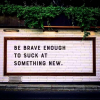It turns out the jazz ensemble in the community band my wife and I play in needs a bass player. The group isn’t very accomplished (yet) and in four years they have never been able to attract a bass player. So the trumpet player, asst. director has been playing the bass part. Me thinks I see the beginning of a very nice project for myself, learning to play bass guitar. Now in my first week the hardest thing is learning to play in bass clef. I wrote this blog post in my blog that is mostly for me. But I bet there are others who picked up another instrument to play during the pandemic. I can't be the only one.

 biskey7.wordpress.com
biskey7.wordpress.com

Project Du Jour: Learn to Play Bass
It turns out the jazz ensemble in the community band my wife and I play in needs a bass player. The group isn’t very accomplished (yet) and in four years they have never been able to attract …



